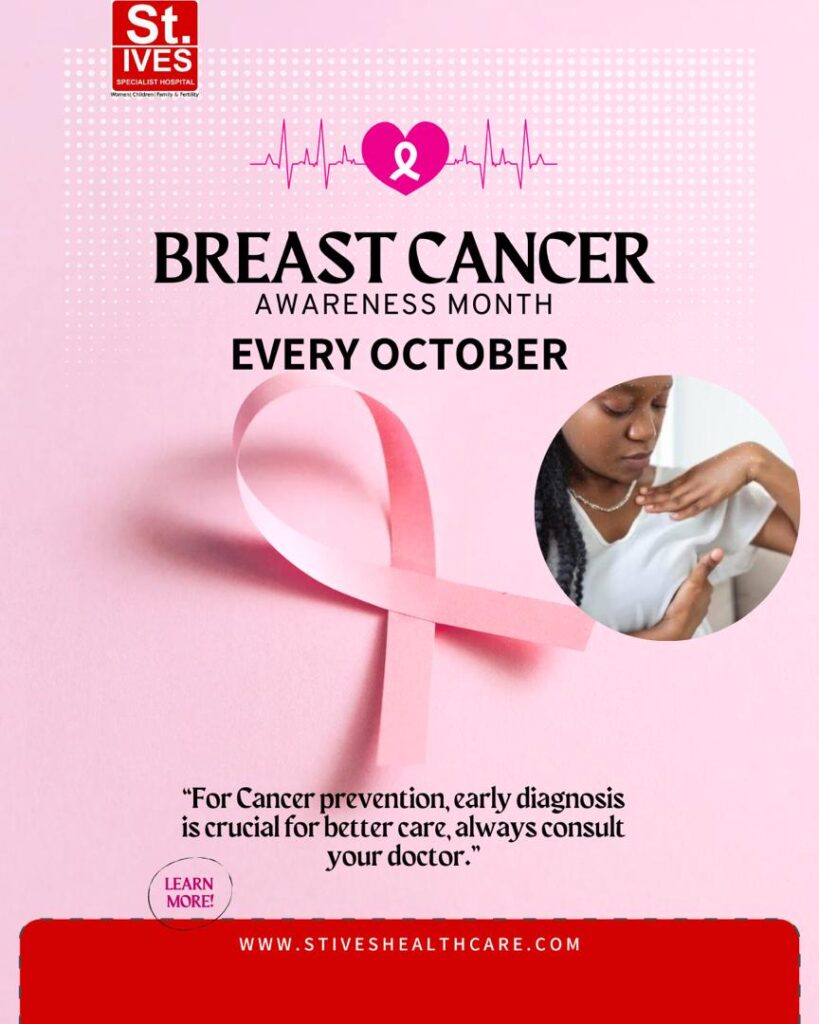Breast cancer remains one of the most prevalent forms of cancer worldwide, affecting millions of women each year. This October, as we observe Breast Cancer Awareness Month, St. Ives Hospital is dedicated to raising awareness and providing vital information on the early detection, treatment, and support systems available for women. From the 6th to the 12th of October, we are holding a special awareness week filled with activities aimed at empowering women with the knowledge and tools they need to take control of their breast health.
One of the highlights of the week is a special Instagram Live session on October 10th with Prof. Mobolaji Oludara, a renowned expert in breast cancer treatment. Prof. Oludara will share his vast experience on breast cancer, focusing on the importance of early detection, the latest advancements in treatment, and how we can all support those battling the disease.
What is Breast Cancer?
Breast cancer occurs when cells in the breast begin to grow abnormally, forming a lump or mass. While it can affect both men and women, women are at a much higher risk. There are various types of breast cancer, but the most common is invasive ductal carcinoma, which starts in the ducts of the breast and spreads to surrounding tissue.
Early detection is crucial to successful treatment. Regular breast self-exams and mammograms are key in catching the disease at its earliest stages when treatment is most effective.
Risk Factors
Several factors can increase the risk of developing breast cancer:
Age: The risk increases as women grow older, with most cases diagnosed after age 50.
Family History: Having close relatives, such as a mother, sister, or daughter, who has had breast cancer can increase your risk.
Genetic Mutations: Inherited mutations in certain genes, such as BRCA1 and BRCA2, can significantly raise the risk of breast cancer.
Lifestyle Choices: Factors such as obesity, lack of physical activity, smoking, and excessive alcohol use have also been linked to an increased risk of breast cancer.
Signs and Symptoms
Early-stage breast cancer often shows no symptoms, which is why routine screening is so important. However, there are some warning signs to watch for, including:
A new lump or thickening in the breast or underarm.
Changes in the size, shape, or appearance of the breast.
Dimpling or puckering of the skin on the breast.
Inverted nipples or changes in nipple discharge.
Persistent breast pain or discomfort.
If you notice any of these signs, it’s essential to see a healthcare professional immediately.
Treatment Options
Thanks to advancements in medical research, breast cancer treatment has evolved significantly over the years. The treatment plan for breast cancer depends on several factors, including the type and stage of cancer, as well as the patient’s overall health. Common treatment options include:
Surgery: Removing the cancerous tissue through a lumpectomy or mastectomy is often the first step.
Radiation Therapy: Using high-energy rays to target and destroy cancer cells, especially after surgery.
Chemotherapy: Using drugs to kill cancer cells or stop them from growing.
Hormone Therapy: Targeting cancers that are hormone-sensitive to stop the body from producing estrogen or progesterone, which can fuel the growth of the cancer.
Targeted Therapy: Using drugs that specifically target cancer cells without affecting normal cells.
The Importance of Early Detection
Early detection of breast cancer can save lives. Regular self-exams, clinical breast exams, and mammograms are vital tools in catching the disease early, even before symptoms appear. At St. Ives Hospital, we offer comprehensive breast screening services, including 3D mammography, which provides a more detailed image of breast tissue, helping detect even the smallest abnormalities.
During our Breast Cancer Awareness Week, from the 6th to 12th of October, we encourage women to take advantage of our discounted breast screening services. Early detection could be the difference between life and death.
Supporting Those Affected by Breast Cancer
Breast cancer doesn’t just impact the person diagnosed; it affects their families, friends, and communities. Emotional and psychological support is crucial for patients navigating the challenges of treatment and recovery. At St. Ives Hospital, we provide a range of support services, including counseling, support groups, and post-treatment care to help survivors regain confidence and adjust to life after treatment.
On October 10th, join Prof. Mobolaji Oludara on our Instagram Live session, where he will delve deeper into these topics and answer your pressing questions on breast cancer. Whether you are a survivor, a caregiver, or simply seeking more information, this session promises to be highly informative.
St. Ives Hospital: Your Partner in Women’s Health
At St. Ives Hospital, we are committed to providing comprehensive healthcare services that address the unique needs of women. Whether it’s regular screenings, advanced treatment options, or post-recovery care, we are here for you every step of the way.
This Breast Cancer Awareness Month, let’s come together to support, empower, and educate ourselves and our loved ones. With early detection and the right treatment, breast cancer is beatable. Don’t wait—schedule your screening today.
Stay tuned to our social media platforms for more updates, and don’t miss out on our Instagram Live session with Prof. Oludara on October 10th!


